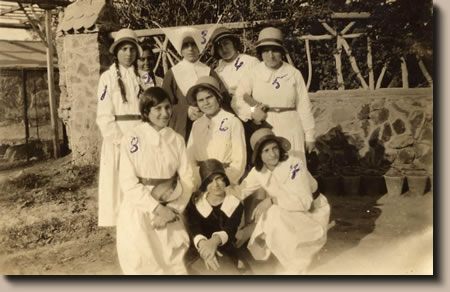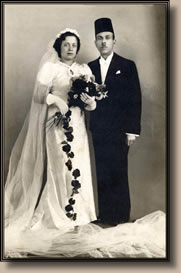THE ROLE OF MRS. ELTAHER
Eltaher led his struggle since his early youth single-handedly, and did not get married until relatively late in life. On February 23, 1939 Eltaher married the mother of his children, Zakeia Bezri, the third of six children born to parents from two well-known Lebanese families hailing from the city of Saïda (Sidon) in Lebanon, the Bezri and the Zantout families, both of which, it is believed originally hailed from North Africa. Following WWI, which resulted in a serious famine in Lebanon, Mrs. Eltaher’s parents had moved with their six children from Saïda to Alexandria in Egypt, where she grew up until she graduated from a respected French school, les Soeurs de la Charité de Saint-Vincent de Paul (The Flying Nuns!).
|
Mrs. Eltaher (1) and classmates with Sister Anne-Marie (3)
in Alexandria in 1932 |
The couple first met during the summer of 1938 in the mountain resort of Hammana in Lebanon, while Eltaher was visiting her brother Salim Bezri, who was an acquaintance of his. Eltaher was around 42 then, and she was 24. It is interesting to note that, while practically the vast majority of marriages in those days were arranged, theirs was certainly not.
|
Wedding portrait of the Eltahers
Cairo 1939 |
Mrs. Eltaher played an important role in her husband’s life. Totally supporting his mission, she stood by him through all the difficult times and crises which left their mark on their family life. She was educated and fluent in Arabic, French and English. She was also well-read, and quite aware of the national and world issues of the day. She helped him edit and type the manuscripts of his books and articles before they went to press. She also welcomed his guests, relatives and companions, whether in Cairo or in Beirut. She also befriended several of his friends and their spouses. Needless to say, that, while he was fighting his battles with her at his side, she was almost single-handedly raising their two children, and picking up the pieces of a difficult life.
She also had a taste of banishment and prison, as she was imprisoned by the Egyptian government in the Foreigners’ Prison in Cairo, after being beaten by a police officer from what used to be known as the Arab Affairs Bureau at the Ministry of the Interior. The officer, Amir-Alay (i.e. Colonel) Mohamed Youssef, had almost staked his professional career for many years on arresting Mohamed Ali Eltaher to please the British authorities, which controlled Egypt in those days. Unfortunately for him, he failed in his mission despite the decoration awarded to him by the British government in recognition of his efforts in making life difficult for Egyptian and Arab nationalists.


